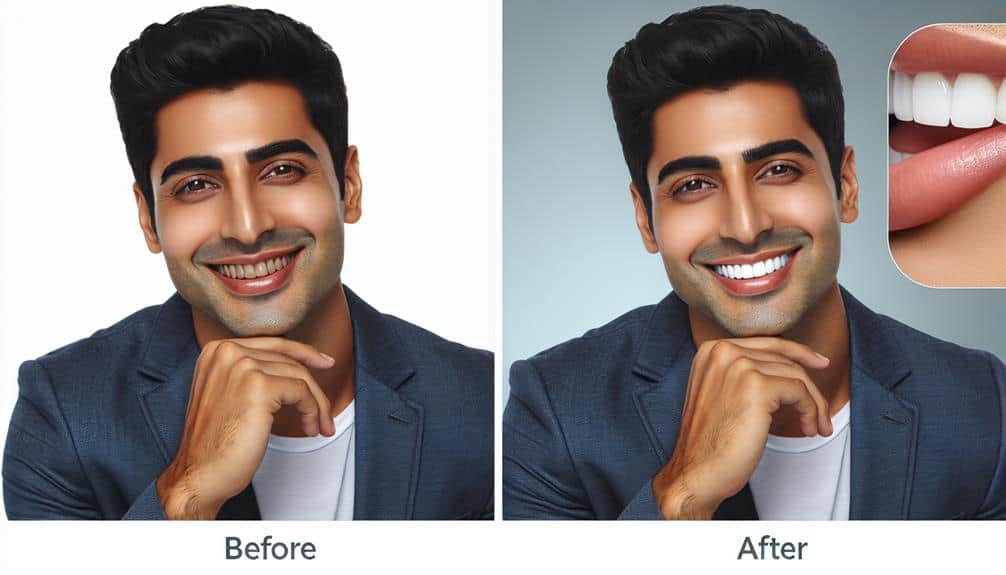When managing sensitivity in professional vs DIY teeth whitening, it's important to contemplate the causes such as high concentrations of bleaching agents, application techniques, and recommended agent strengths. In professional treatments, customized plans with higher agent concentrations and oversight help minimize sensitivity risks while using desensitizing agents post-treatment.
DIY whitening can benefit from lower agent concentrations, desensitizing toothpaste, and fluoride gel for preventive care. To minimize sensitivity, opt for lower agent concentrations, apply desensitizing gel, and consult a dentist if there is a history of sensitivity or dental issues. Understanding these key differences can help you achieve best whitening results effectively.
Key Points
- Professional whitening offers customized treatment plans to minimize sensitivity risks.
- DIY whitening should use lower concentrations and desensitizing products to reduce sensitivity.
- Desensitizing agents are commonly used in professional treatments to alleviate post-treatment sensitivity.
- Consulting a dental professional for persistent sensitivity ensures personalized solutions.
- Space out DIY whitening treatments and use desensitizing techniques to manage sensitivity effectively.
Sensitivity Causes in Whitening Methods
When considering the causes of sensitivity in teeth whitening methods, it's important to understand the various factors that can contribute to this common issue. Sensitivity prevention is vital in managing discomfort during and after whitening treatments. One key factor leading to sensitivity is the use of high concentrations of bleaching agents in over-the-counter products or improper application techniques. To prevent sensitivity, opt for products with lower concentrations of whitening agents or consider professional treatments where the process is monitored by a dental professional.
Product recommendations play a significant role in managing sensitivity during teeth whitening. Look for toothpaste and mouthwash specifically designed for sensitive teeth. These products typically contain potassium nitrate or fluoride, which help to reduce sensitivity and strengthen tooth enamel. Additionally, desensitizing gels or fluoride varnishes applied before or after whitening treatments can help alleviate sensitivity. Choosing the right products tailored to sensitive teeth can make a notable difference in your whitening experience.
Understanding Professional Whitening Sensitivity
How does professional teeth whitening impact sensitivity levels compared to over-the-counter methods?
When it comes to sensitivity management in professional teeth whitening, there are several key factors to keep in mind:
- Customized Treatment Plans: Professional care allows for personalized treatment plans tailored to your specific needs, which can help minimize sensitivity issues.
- Higher Concentrations: Professional whitening treatments often use higher concentrations of whitening agents, which can lead to increased sensitivity during and after the procedure.
- Professional Oversight: Having a dental professional oversee the whitening process guarantees that the treatment is applied correctly, reducing the risk of sensitivity.
- Desensitizing Agents: Dental professionals may use desensitizing agents or techniques to help alleviate sensitivity post-treatment, enhancing the overall whitening experience.
Addressing Sensitivity in DIY Whitening
Address sensitivity in DIY whitening by implementing strategies to mitigate potential discomfort and adverse effects. When starting on at-home teeth whitening, preventing discomfort should be a priority.
One key approach is to choose products with lower concentrations of whitening agents, such as those containing 10% carbamide peroxide instead of higher concentrations. This can help reduce the likelihood of sensitivity while still providing effective results. Additionally, consider using desensitizing toothpaste for a week or two before commencing whitening treatment. These toothpastes contain ingredients like potassium nitrate or strontium chloride, which help block pain signals to the tooth nerves.
Another at-home solution to minimize sensitivity is to apply a thin layer of fluoride gel to your teeth using custom trays. Fluoride helps strengthen the enamel and can reduce sensitivity during and after whitening treatments. Moreover, avoid consuming very hot or cold foods and beverages during the whitening process, as sensitivity may be heightened.
Tips to Minimize Sensitivity in Whitening
To minimize sensitivity in whitening treatments, consider adjusting the concentration of whitening agents and implementing desensitizing techniques to enhance comfort and effectiveness. Here are some tips to help you manage sensitivity and prevent pain during teeth whitening:
- Use a Lower Concentration Whitening Gel: Opt for a whitening gel with a lower concentration of active ingredients to reduce the risk of sensitivity while still achieving desired results.
- Apply Desensitizing Gel: Prior to whitening treatment, apply desensitizing gel containing potassium nitrate or fluoride to help block pain signals and protect nerve endings.
- Limit Whitening Frequency: Avoid over-whitening your teeth; space out treatments to give your teeth time to recover and minimize sensitivity.
- Consult Your Dentist: Seek advice from your dentist before starting any whitening treatment, especially if you have a history of sensitivity or dental issues.
Seeking Professional Help for Sensitivity
Wondering when to seek professional help for managing teeth whitening sensitivity? If you experience persistent sensitivity after trying various at-home remedies, it may be time to consult a dental professional. Professional recommendations can provide personalized solutions to address your specific sensitivity issues effectively.
Dentists can offer professional-grade desensitizing treatments, such as fluoride varnishes or gels, to help alleviate sensitivity post-teeth whitening. These products can strengthen enamel and reduce discomfort, providing relief while ensuring the health of your teeth.
Moreover, dental professionals can assess the underlying causes of your sensitivity and provide tailored advice on sensitivity prevention. They may recommend adjusting your whitening treatment frequency, switching to gentler whitening products, or using specialized toothpaste for sensitive teeth. By seeking professional help, you can benefit from expert guidance to manage sensitivity effectively and achieve a brighter, healthier smile without compromising your dental health.
Frequently Asked Questions
Can Certain Pre-Existing Dental Conditions Increase Sensitivity During Teeth Whitening Treatments?
Certain pre-existing dental conditions can indeed increase sensitivity during teeth whitening treatments. Sensitivity management is essential when addressing these issues. Consider consulting a dental professional for personalized advice and treatment recommendations tailored to your specific dental conditions.
Are There Any Natural Remedies or Home Remedies That Can Help Alleviate Sensitivity During DIY Teeth Whitening?
To ease sensitivity during DIY teeth whitening, try natural remedies like applying coconut oil or aloe vera to soothe gums. Also, using a desensitizing toothpaste beforehand can help manage discomfort effectively at home.
How Long Does Sensitivity Typically Last After a Professional Teeth Whitening Treatment?
After a professional teeth whitening treatment, sensitivity typically lasts for a few days to a week. This duration can vary based on individual factors. Proper post-treatment care, like using desensitizing toothpaste, can help manage sensitivity effectively.
Are There Specific Types of Toothpaste or Mouthwash That Can Help Reduce Sensitivity After Teeth Whitening?
When it comes to sensitivity prevention post-teeth whitening, consider toothpaste options like those with potassium nitrate. Additionally, using a mouthwash with fluoride can provide sensitivity relief and strengthen enamel. These choices can help manage discomfort effectively.
Can Sensitivity During Teeth Whitening Treatments Be a Sign of a More Serious Dental Issue That Requires Professional Attention?
If sensitivity persists during teeth whitening, it could indicate a deeper dental issue. Seeking professional care is essential if pain worsens or if you experience other symptoms, as it may signal a dental emergency.
Conclusion
In summary, managing sensitivity in teeth whitening is essential for a comfortable experience. Whether opting for professional treatment or DIY methods, understanding the causes of sensitivity and implementing proactive measures can make a significant difference.
Remember, addressing sensitivity promptly can prevent discomfort and guarantee a successful whitening outcome. Just like a well-tuned instrument produces beautiful music, taking care of sensitivity in teeth whitening can lead to a brighter, more confident smile.



